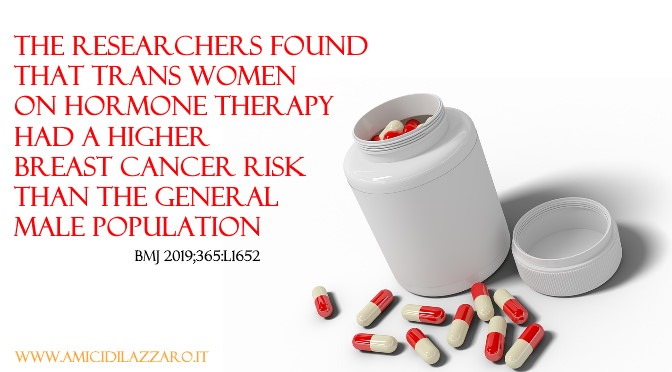
Transgender women on gender-confirming hormone therapy have increased odds of breast cancer, but the overall risk is low and not as high as it is for the general female population, a new study finds.
Trans women are those who were declared male at birth but identify as female.
Previous research has shown that hormone replacement therapy (HRT) increases the risk of breast cancer in postmenopausal women, but it is not clear whether the same is true for trans women undergoing hormone therapy.
The new study looked at 2,260 trans women and 1,229 trans men who underwent sex-affirming hormone therapy in clinics in the Netherlands between 1972 and 2016.
The results showed that trans women who underwent hormone therapy had a higher risk of breast cancer than men in general. And transgender men (with female sex at birth and male gender identity) were found to have a lower risk of breast cancer than the general female population. The mean age at the start of hormone therapy was 31 years for trans women and 23 years for trans men, and the mean duration of treatment was 13 years for trans women and 8 years for trans men.
Among trans women, 15 cases of invasive breast cancer were diagnosed at an average age of 50 years. They had received hormone therapy for an average of 18 years. This is higher than the overall male population but lower than the overall female population, according to a study published May 14 in the BMJ. Four cases of invasive breast cancer were identified in trans men. The average age of the patients was 47 years and they had received hormone therapy for an average of 15 years. The rate was lower than the general female population.
The results show that the overall risk of breast cancer in transgender people is low, so current screening guidelines are sufficient for those on hormone therapy, according to the study authors.
The researchers were led by Martin den Heijer, of the department of internal medicine/endocrinology at University Medical Center in Amsterdam.
The researchers pointed out that breast cancer risk among trans women rose after a relatively short period of hormone treatment. “It would be worthwhile for future studies to investigate in more detail the cause of breast cancer in transgender people receiving hormone treatment,” the authors concluded in a journal news release.
As this is an observational study, cause and effect cannot be proven. They also noted the limitations of the study, including incomplete or missing data on type of hormone use, family history, genetic variation, tobacco and alcohol use, and body mass index.
Conclusions This study showed an increased risk of breast cancer in trans women compared with cisgender men, and a lower risk in trans men compared with cisgender women. In trans women, the risk of breast cancer increased during a relatively short duration of hormone treatment and the characteristics of the breast cancer resembled a more female pattern. These results suggest that breast cancer screening guidelines for cisgender people are sufficient for transgender people using hormone treatment.

